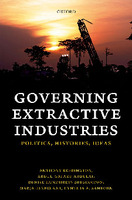Governing Extractive Industries
Politics, Histories, Ideas
Author(s)
Bebbington, Anthony
Abdulai, Abdul-Gafaru
Humphreys Bebbington, Denise
Hinfelaar, Marja
Sanborn, Cynthia
Language
EnglishAbstract
Proposals for more effective natural resource governance emphasize the importance of institutions and governance, but say less about the political conditions under which institutional change occurs. This book synthesizes findings regarding the political drivers of institutional change in extractive industry governance. The authors analyse resource governance from the late nineteenth century to the present in Bolivia, Ghana, Peru, and Zambia. They focus on the ways in which resource governance and national political settlements interact. Special attention is paid to the nature of elite politics, the emergence of new political actors, forms of political contention, changing ideas regarding natural resources and development, the geography of natural resource deposits, and the influence of the transnational political economy of global commodity production. National elites and subnational actors are in continuous contention over extractive industry governance. Resource rents are used by elites to manage this contention and incorporate actors into governing coalitions and overall political settlements. Periodically, new resource frontiers are opened, and new political actors emerge with the power to redefine how extractive industries are governed and used as instruments for development. Colonial and post-colonial histories of resource extraction continue to give political valence to ideas of resource nationalism that mobilize actors who challenge existing institutional arrangements. The book is innovative in its focus on the political longue durée, and the use of in-depth, comparative, country-level analysis in Africa and Latin America, to build a theoretical argument that accounts for both similarity and divergence between these regions.
Keywords
mining; extractive industry; natural resource governance; political settlements; Bolivia; Ghana; Peru; Zambia; inclusive development; HydrocarbonDOI
10.1093/oso/9780198820932.001.0001ISBN
9780198820932OCN
1076724227Publisher
Oxford University PressPublisher website
https://global.oup.com/Publication date and place
Oxford, UK, 2018Classification
Earth Sciences, Geography, Environment, Planning


 Download
Download